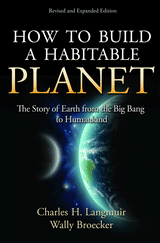Earth and Humans: A Planetary Perspective
Science for the Public: The Public Science Lectures
May 06, 2014 Cambridge Public Library, Cambridge, MA
This lecture was the second in our 4-part series on health and environment at Cambridge Library.
Charles Langmuir, PhD, Higgins Professor of Geochemistry, Harvard University.

Over 4.5 billion years, Earth has evolved from a mass of rock and metal to a planet teeming with life and energy. The emergence and evolution of life has progressively modified the planet, just as the evolution of the planet has influenced the development of the great variety of organisms. For modern humanity, this deep relationship has become increasingly obvious. Placing civilization in the context of this relationship provides a novel perspective on current environmental problems, and raises the question of the potential role of intelligent life in planetary evolution.
Charles Langmuir has carved a distinguished career in the international science arena investigating many aspects of the solid earth geochemical cycle. He has recently co-led the first investigation of the Arctic Ocean ridge system, and over two decades has explored the seafloor through some 20 research cruises. Dr. Langmuir is a Fellow of the American Academy of Arts and Sciences, the Geochemical Society, and the American Geophysical Union, from which he received the N. L. Bowen Award in 1996. He received the Holmes Medal of the European Union of Geosciences in 2003.
Charles Langmuir and Wally Broecker Honorable Mention for the 2012 Best Professional/Scholarly Book in Earth Sciences, Association of American Publishers.
SftPublic Author page for Dr. Langmuir

